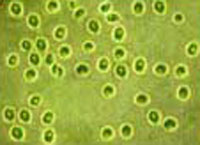Chlorella is a green single-celled freshwater alga, found to have many health benefits. Its benefits have long been acknowledged in the Far East, where it has been one of the most popular food supplements for nearly 30 years. However, it has only recently become available in the West. Chlorella measures about 2 to 10 µm in diameter, similar to human blood cells. It grows most rapidly in areas with plenty of sunlight, clean air and fresh water, and the biggest producers of Chlorella are in the Far East.

Discovery and development
Chlorella was one of the first life forms to exist on our planet 3.5 billion years ago. It was first discovered in 1890 but only became available to consumers at the end of the 1970s when a method of breaking down the tough cell wall was found.
Why use Chlorella?
Over time, the chemicals and toxins in the food and drink we consume, and the impurities in the air we breathe, can build up in our bodies and weaken our immune system. Nature Complete Certified Organic Chlorella can naturally detoxify the body and restore your immune system to its optimum level.
Nutrients and benefits
Chlorella is nature’s richest whole plant source of chlorophyll, DNA and RNA, and contains more than 19 amino acids, including all the essential ones. It also contains the Chlorella Growth Factor (CGF), only found in Chlorella.
The following are the key nutritional benefits of Chlorella
| Chlorella Growth Factor (CGF) | Chlorella contains the unique Chlorella Growth Factor (CGF), which helps its own cells to reproduce rapidly (four new cells every 20-24 hours) and is similarly thought to help repair damaged tissue and heal wounds in humans |
| Chlorophyll | Chlorophyll is only one molecule different from haemoglobin in human blood and is thought to help detoxify our bodies. Chlorella provides 50 times more chlorophyll than alfalfa |
| Beta carotene | It is pure vitamin A. This antioxidant aids vision in dim light |
| Vitamin B 12 | A key role in the normal functioning of the brain and nervous system, and for the formation of blood. It is one of the eight B vitamins. It is normally involved in the metabolism of every cell of the human body, especially affecting DNA synthesis and regulation, but also fatty acid metabolism and amino acid metabolism |
| Protein | An important building block of bones, muscles, cartilage, skin, and blood |
| Iodine | Vital for normal thyroid function |
| Iron | Helps carry oxygen throughout the body and is essential for healthy blood cells and keeps muscle healthy |
| Zinc | Helps produce new cells and enzymes and promotes the healing of wounds |
| Potassium | Helps maintain a healthy heart, lowers blood pressure |
| Magnesium | Helps turn the food we eat into energy, lowers blood pressure, keeps bones healthy and helps prevent osteoporosis |
| Calcium | Essential for strong bones and teeth, regulates muscle contraction |
| Phosphorus | Helps maintain healthy teeth and bone, also metabolic energy |
| Vitamin C | Also known as ascorbic acid, this is one of the most essential elements of any diet, and is particularly beneficial to the immune system, in helping to prevent colds and flu |
